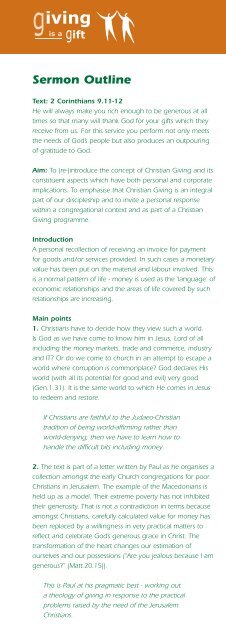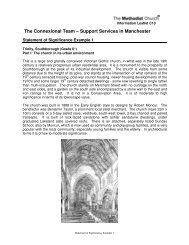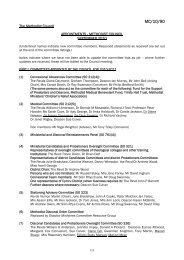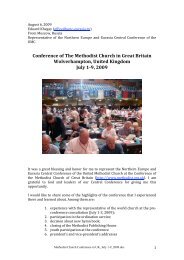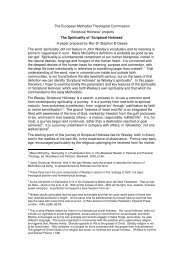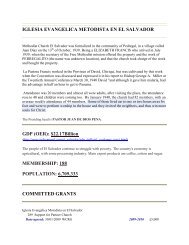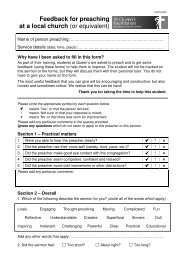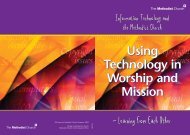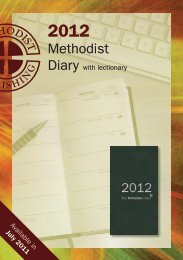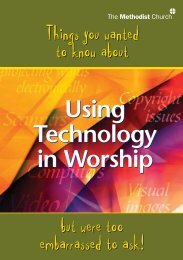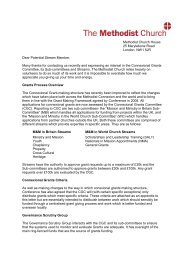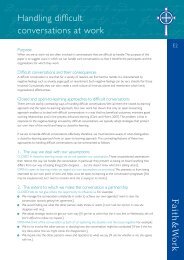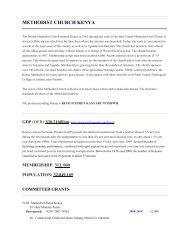Sermon outline
Sermon outline
Sermon outline
Create successful ePaper yourself
Turn your PDF publications into a flip-book with our unique Google optimized e-Paper software.
g iving<br />
is a g ift<br />
<strong>Sermon</strong> Outline<br />
Text: 2 Corinthians 9.11-12<br />
He will always make you rich enough to be generous at all<br />
times so that many will thank God for your gifts which they<br />
receive from us. For this service you perform not only meets<br />
the needs of God’s people but also produces an outpouring<br />
of gratitude to God.<br />
Aim: To (re-)introduce the concept of Christian Giving and its<br />
constituent aspects which have both personal and corporate<br />
implications. To emphasise that Christian Giving is an integral<br />
part of our discipleship and to invite a personal response<br />
within a congregational context and as part of a Christian<br />
Giving programme.<br />
Introduction<br />
A personal recollection of receiving an invoice for payment<br />
for goods and/or services provided. In such cases a monetary<br />
value has been put on the material and labour involved. This<br />
is a normal pattern of life - money is used as the ‘language’ of<br />
economic relationships and the areas of life covered by such<br />
relationships are increasing.<br />
Main points<br />
1. Christians have to decide how they view such a world.<br />
Is God as we have come to know him in Jesus, Lord of all<br />
including the money markets, trade and commerce, industry<br />
and IT Or do we come to church in an attempt to escape a<br />
world where corruption is commonplace God declares His<br />
world (with all its potential for good and evil) very good<br />
(Gen.1.31). It is the same world to which He comes in Jesus<br />
to redeem and restore.<br />
If Christians are faithful to the Judaeo-Christian<br />
tradition of being world-affirming rather than<br />
world-denying, then we have to learn how to<br />
handle the difficult bits including money.<br />
2. The text is part of a letter written by Paul as he organises a<br />
collection amongst the early Church congregations for poor<br />
Christians in Jerusalem. The example of the Macedonians is<br />
held up as a model. Their extreme poverty has not inhibited<br />
their generosity. That is not a contradiction in terms because<br />
amongst Christians, carefully calculated value for money has<br />
been replaced by a willingness in very practical matters to<br />
reflect and celebrate God’s generous grace in Christ. The<br />
transformation of the heart changes our estimation of<br />
ourselves and our possessions (“Are you jealous because I am<br />
generous” (Matt.20.15)).<br />
This is Paul at his pragmatic best - working out<br />
a theology of giving in response to the practical<br />
problems raised by the need of the Jerusalem<br />
Christians.
3. What are the essentials of his understanding<br />
a) God is creator of all and everything we are and possess is<br />
a gift held in trust for which we are asked to act as stewards.<br />
Discipleship is about how we live in God’s world, not how<br />
we escape from it.<br />
b) The “riches of Christ” change the way in which we think<br />
of our poverty/wealth. No-one is too poor to be generous<br />
nor too rich to give in proportion to their wealth.<br />
c) Giving to the work of the Kingdom is to be “thanks-giving”<br />
done willingly and cheerfully.<br />
d) God’s continued commitment to His world should trigger<br />
our response of regular and committed giving.<br />
Conclusion<br />
Christian giving is an act of thankfulness and belonging to<br />
God’s people. Value for money is not the language of the<br />
Kingdom and congregations should be anticipating the<br />
Kingdom by the way in which they administer their affairs.<br />
The vision is of members of congregations growing into<br />
loving and faithful discipleship who give thankfully and<br />
generously and who never refer to “balancing the books”.<br />
It is a vision of a church which has a lively sense of its place<br />
in its community whose mission is not inhibited because “we<br />
can’t afford it” and which struggles not to pay the bills but<br />
to decide how best to use all the money at its disposal.<br />
Would you like to belong to a church like that You can.<br />
If the church is people then overall we are not poor - it’s just<br />
that pockets and purses have yet to be converted.<br />
Illustration: Minister to congregation “This morning I<br />
have two pieces of bad news and one piece of good news.<br />
The first piece of bad news is that the church roof needs<br />
replacing. The good news is that we have the money.<br />
The second piece of bad news is that it’s still in your pockets<br />
and purses!”.<br />
A Christian Giving programme is not about persuading each<br />
of you to give a little more to “balance the books”.<br />
It is an invitation to take a step of faith in your discipleship -<br />
giving thankfully and cheerfully in proportion to your means<br />
and discovering what a liberating experience that is for you<br />
and for the church.<br />
When you get your letter please:<br />
Read it carefully and prayerfully.<br />
Receive your visitor graciously.<br />
Make your response thankfully.


